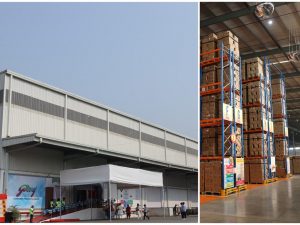Kelvin Seow, CCO, AISATS in an exclusive interview with us shared, “AISATS logistics park has the world-class infrastructure and over 350k MT to 500k MT cargo handling capacity to handle variety of cargo coming in from all parts of the world. The 2,50,000 sq. ft. facility has main warehouse, consolidation center and office amenities. Out of total 2,50,000 sq ft space – 10,000 sq ft warehousing space is dedicated to the Bonded cargo. The MMLP has cargo handling capacity of 350k tons to 500k tons, but there are plans to expand infrastructure further. AISATS has tied up with domestic and international forwarders and airlines such as FedEx, Kuehne+Nagel, DHL, DSV. Special focus is on the SMEs to utilise the facility for their cargo handling and storage purposes. Tenants can use the space for processing, sorting, labelling and packaging of the shipments. AISATS has also launched EVs for all kinds of cargo movements towards Bangalore Airport, Menzies Aviation Terminal and WFS. The focus is on enhancing end to end operations and maintaining security in the cargo premises by deploying the best of technologies such as video analytics, CCTVs and other equipment. The facility, already operational is ready to handle variety of cargo from perishables, pharma, electronics, automobile to dangerous goods.”
Read More »‘India crucial market for pharma, IT, renewable energy & machinery’
I Ahead of upcoming FIATA RAP Meet in New Delhi in May, Đào Trọng Khoa, President, Vietnam Logistics Business Association (VLA) shared, “The ‘Make in India’ initiative has helped India promote domestic production and attract foreign investment. VLA highly values the trade and investment potential with India, especially given the long-standing traditional friendship between the two nations. Vietnam and India established diplomatic relations in 1972 and elevated ties to a Comprehensive Strategic Partnership nine years ago. India is now one of Vietnam’s top 8 trading partners and its largest trading partner in South Asia, accounting for nearly 80% of Vietnam’s exports to the region. Meanwhile, Vietnam ranks as India’s 17th largest global trading partner and 4th largest within ASEAN. India’s geographical location makes it a gateway for Vietnamese goods to access South Asian markets, and conversely, Vietnam is seen as a gateway for Indian goods into ASEAN and Vietnam’s trade partner countries. The complementary nature of the two countries’ trade structures is also a major factor behind the rapid and positive development of Vietnam–India economic relations. The two countries hold great potential for cooperation in IT, pharmaceuticals, machinery, renewable energy, and logistics services. India’s market remains wide open for Vietnamese exports, particularly agricultural products, seafood, and consumer goods. These are the very reasons why VLA was approved by Vietnam’s Ministry of Industry and Trade to organize a National Trade Promotion Program in India in May 2025—one of its key missions being to participate in the FIATA Region Asia Pacific (RAP) Annual Meeting 2025.”
Read More »Emirates SkyCargo invests in hydrogen-powered trucks
Emirates SkyCargo, in collaboration with freight forwarder and haulier Allied Transport Company, is all set to add five hydrogen-powered trucks to its fleet by the first quarter of 2026 as it seeks to improve the environmental performance of its ground operations. The carrier’s existing fleet of over 60 trucks link Dubai World Central and Dubai International Airport as well as serving the wider domestic region. The new hydrogen-powered trucks will have a capacity of 28 tonnes – the same as SkyCargo’s current diesel-powered vehicles – and will emit substantially less CO2. They have a range of up to 700 km on a full tank and will refuel at two stations in Dubai. In addition, the new vehicles are tractor units that are compatible with a variety of trailers, enabling them to accommodate various types of cargo.
Read More »Kale to digitalise Mexico cargo handling operations
Kale Logistics Solutions is all set to implement GALAXY air cargo community system at México City Airport for cargo handling. GALAXY, which is currently in use at more than 120 airports across the world, will streamline export, import and transit operations by digitalising all shipment data. It will offer real-time transparency for all stakeholders and eliminate the risk of incorrect shipment data appearing on paper copies, Kale said. The cloud-based system means that even México Cargo Handling warehouse operators will use handheld devices to make the entire cargo handling process paperless. “At México Cargo Handling we are looking at digital innovation to provide better value to our customers,” said Mathilde de Rocquigny, chief executive at the handler. “We are happy to partner with Kale on creating the right digital infrastructure at our facilities to become more efficient, sustainable, and provide better visibility to our customers.” Amar More, president of Kale, added: “Enhancing customer experience, building operational excellence, and free-up talent from routine support tasks to focus on higher-value activities around transformation and innovation is the fundamental requirement of every airport cargo ground handler worldwide.”
Read More »‘Govt initiative to begin ops in 100 regional airports will improve cargo flow’
Afzal Malbarwala, Managing Director, Galaxy Freight said, “While Tier 1 and metro areas have historically seen the majority of air traffic, there has been a slight diversification over the past eight to nine years. The top six metro areas’ overall air traffic share in India has decreased from 69 per cent in FY 13 to 63 per cent in FY 21, with smaller airports taking up an increasing percentage of the total each year. Initiatives that have led to this are: growing number of smaller airports, initiative of the Indian Ministry of Civil Aviation to expand and modernise the nation’s aviation network, particularly in Tier 2+ cities, expansion of the Regional Connectivity Scheme – UDAN to 1,000 routes and 100 airports, government initiative to begin operations in 100 additional airports in the upcoming five years and creating an ecosystem that will support the expansion of Indian carriers by assisting them in growing their current fleets and creating a welcoming environment for cargo operations in India.”
Read More »‘Investments in regional infrastructure to support export potential vital’
Arun Chandra, Vice President – Aviation Business, BIAL aid, “Programs like UDAN have catalysed regional air connectivity, while state governments and private players are investing in regional infrastructure to support export potential directly from these production centres. BLR Airport is actively supporting this shift. As the primary gateway for South India, our cargo terminals has been designed to create stronger linkages with regional markets across Karnataka, Tamil Nadu, Andhra Pradesh, and Kerala. Our collaboration with express logistics players and integration with road feeder services enables time-bound cargo movement from smaller cities to global destinations via Bengaluru.”
Read More »‘UDAN scheme has been impactful in improving regional air cargo connectivity’
Amit Tandon, CEO & Managing Director, Asia Shipping India said, “India has recognised the importance of expanding its domestic air cargo ecosystem beyond just the metro cities, and that is where Tier 2 and Tier 3 cities are starting to play a much bigger role. One of the most impactful initiatives has been the UDAN scheme, which focuses on improving regional air connectivity. Under this, many smaller airports have been upgraded to handle not just passenger traffic but also cargo—especially for sectors like agriculture, pharma, and e-commerce that need faster, more efficient logistics. More airports are being developed under this scheme as greenfield projects. A strong momentum is also seen through the Gati Shakti initiative and the National Logistics Policy, both of which prioritise developing multimodal logistics infrastructure in non-metro regions. These efforts are aimed at linking regional production hubs, like textile clusters, industrial parks and agri zones, to national and international markets via air. The increasing connectivity of the moffusil airports to the gateway airports also improves the efficiency of the export activity for the perishable products. What is promising is the growing investment in infrastructure like modern and well-equipped warehouses, temperature-controlled storage, digital cargo tracking, and bonded warehousing, at regional airports. Private players are also stepping in, which is helping to accelerate the process. Furthermore, cities like Indore, Lucknow, Coimbatore, and Guwahati and other export centres are already emerging as cargo nodes, and this trend is only going to strengthen with the passage of time. It’s a big step forward for inclusive trade growth and building a truly nationwide logistics network.
Read More »Godrej opens 1st vertical storage warehouse in Bhiwandi
Godrej Consumer Products Limited (GCPL) has inaugurated its first Vertical Storage Warehouse in Bhiwandi, Thane district, Maharashtra. Spread across 2.84 lakh sq. ft., the warehouse features over 3,200 pallet positions and a high-density G+6 vertical racking system, significantly maximizing storage efficiency while minimizing physical footprint. Serving as the mother hub for key regional markets—Maharashtra, Goa, Gujarat, and Madhya Pradesh—the facility is designed to enable agile, responsive logistics tailored to evolving business needs. Saurabh Jhawar, Head – Product Supply Organisation, India & SAARC, Godrej Consumer Products Ltd (GCPL), said, “The launch of our first vertical storage warehouse is a transformative step in our journey toward building a smart, agile, and future-ready supply chain. In just 18 months under Project Parivartan, we have upgraded a majority of our key logistics hubs to Grade A facilities. This new warehouse in Maharashtra stands as a beacon of our commitment to operational excellence, digital integration, and sustainable growth—allowing us to serve our consumers with enhanced speed, safety, and care.” In March 2025, GCPL launched its first integrated greenfield plant in Tamil Nadu—representing a transformational shift in manufacturing. This advanced facility, the company’s first fully integrated plant under one roof, will manufacture products from some of GCPL’s most popular brands, including Cinthol, Godrej No.1, Goodknight, Godrej aer, and Godrej Expert Hair Colour. With the addition of the Vertical Storage Warehouse, GCPL is further strengthening its national distribution network. This marks a strategic shift toward real-time, data-led decision-making and automated scheduling systems that will enhance supply chain agility and responsiveness. This development underscores GCPL’s unwavering belief in creating shared value and building resilient, innovation-driven infrastructure that aligns with its broader ambition—to lead with purpose and redefine excellence …
Read More »‘Exporters rushing to ship goods to US, rates hiked ’
Sateshwar Tuteja, Director – Sales at Jeena & Company shares his viewpoint on the 90 days pause on US trade tariffs, he said, “The imposition of U S tariffs across the globe has been a major concern for all the manufacturers, and traders. The recent developments have only caused chaos and uncertainty leading to impact on overall trade. The announcement of 90-days suspension is seen as a positive outlook for leveraging the maximum export opportunity. This temporary pause has offered a narrow but vital window for the global manufacturers to breathe and strategize for the next phase of their business journey. All sectors are rushing to export goods in bulk to the U.S, which has in turn created an extensive demand for logistics and operations. We might witness an initial double-digit spike in freight rates as exporters are rushing to book consignments. In the international market, the freight rates rose 3% to $2265 per 40 containers last week, according to Dewry’s World Container Index. This surge in export volumes has added a layer of burden on the logistics industry that is witnessing capacity constraints, shortage of storage (effective warehouses and temperature-sensitive zones), and influence on trade patterns. To ensure seamless deliveries and shipments, supply-chain structures must be analysed in order to mitigate disruptions, which are created by new tariffs. An assessment of current routing can be done to optimize existing pressures of tariffs. Both the logistics players and manufacturers should collaborate to plan mid-term strategies and prepare accordingly to get maximum gains from this opportunity. This 90-day window presents a valuable opportunity to assess the performance of our regular vendors, evaluate their ability to exceed key performance indicators (KPIs), refine …
Read More »DP World launches Bharat Africa Setu to promote trade
DP World announced the launch of the Bharat Africa Setu. This initiative is being developed under the guidance of the Government of India’s Ministry of Commerce and Industry and Ministry of External Affairs. This platform will provide Indian businesses access to robust warehousing, trade finance, and distribution networks—fuelling south-south cooperation and inclusive growth. It will connect India and Africa through sea and air connectivity between ports, economic zones and logistics parks operated by DP World in both geographies. The Bharat Africa Setu will provide Indian exporters with access to 53 African countries where DP World already has a strong logistics footprint, connecting to 260,000 points of sale. His Excellency Sultan Ahmed bin Sulayem, Group Chairman and Chief Executive Officer of DP World unveiled the ‘Bharat Africa Setu’ initiative in the presence of Shri Piyush Goyal, Honourable Minister of Commerce and Industry, Government of India and other dignitaries at the Dubai-India Business Forum in Mumbai. Africa imports approximately USD 430 billion worth of goods from various countries, presenting a significant market for global exporters. Currently, India exports USD 28 billion worth of goods to Africa, accounting for 6.5% of Africa’s total imports. This offers a significant opportunity for India’s export economy to grow its share to 12% by 2030. The Bharat Africa Setu will combine efficient physical infrastructure with value added services – thus creating a holistic trade ecosystem. It will enable Indian manufacturers to display new and upcoming product concepts. It will further ensure ease of access to trade support services such as export finance, marketing & branding, packaging, logistics, testing & certification services and reduce cash flow constraints. Additionally, it will also facilitate ease in compliance with regulatory processes, …
Read More » Cargo Breaking News
Cargo Breaking News









